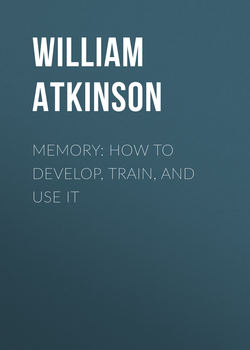Memory: How to Develop, Train, and Use It

Реклама. ООО «ЛитРес», ИНН: 7719571260.
Оглавление
Atkinson William Walker. Memory: How to Develop, Train, and Use It
CHAPTER I. MEMORY: ITS IMPORTANCE
CHAPTER II. CULTIVATION OF THE MEMORY
CHAPTER III. CELEBRATED CASES OF MEMORY
CHAPTER IV. MEMORY SYSTEMS
CHAPTER V. THE SUBCONSCIOUS RECORD-FILE
CHAPTER VI. ATTENTION
CHAPTER VII. ASSOCIATION
CHAPTER VIII. PHASES OF MEMORY
CHAPTER IX. TRAINING THE EYE
CHAPTER X. TRAINING THE EAR
CHAPTER XI. HOW TO REMEMBER NAMES
CHAPTER XII. HOW TO REMEMBER FACES
CHAPTER XIII. HOW TO REMEMBER PLACES
CHAPTER XIV. HOW TO REMEMBER NUMBERS
CHAPTER XV. HOW TO REMEMBER MUSIC
CHAPTER XVI. HOW TO REMEMBER OCCURRENCES
CHAPTER XVII. HOW TO REMEMBER FACTS
CHAPTER XVIII. HOW TO REMEMBER WORDS, ETC
CHAPTER XIX. HOW TO REMEMBER BOOKS, PLAYS, TALES, ETC
CHAPTER XX. GENERAL INSTRUCTIONS
Отрывок из книги
This book is written with the fundamental intention and idea of pointing out a rational and workable method whereby the memory may be developed, trained and cultivated. Many persons seem to be under the impression that memories are bestowed by nature, in a fixed degree or possibilities, and that little more can be done for them – in short, that memories are born, not made. But the fallacy of any such idea is demonstrated by the investigations and experiments of all the leading authorities, as well as by the results obtained by persons who have developed and cultivated their own memories by individual effort without the assistance of an instructor. But all such improvement, to be real, must be along certain natural lines and in accordance with the well established laws of psychology, instead of along artificial lines and in defiance of psychological principles. Cultivation of the memory is a far different thing from "trick memory," or feats of mental legerdemain if the term is permissible.
Kay says: "That the memory is capable of indefinite improvement, there can be no manner of doubt; but with regard to the means by which this improvement is to be effected mankind are still greatly in ignorance." Dr. Noah Porter says: "The natural as opposed to the artificial memory depends on the relations of sense and the relations of thought, – the spontaneous memory of the eye and the ear availing itself of the obvious conjunctions of objects which are furnished by space and time, and the rational memory of those higher combinations which the rational faculties superinduce upon those lower. The artificial memory proposes to substitute for the natural and necessary relations under which all objects must present and arrange themselves, an entirely new set of relations that are purely arbitrary and mechanical, which excite little or no other interest than that they are to aid us in remembering. It follows that if the mind tasks itself to the special effort of considering objects under these artificial relations, it will give less attention to those which have a direct and legitimate interest for itself." Granville says: "The defects of most methods which have been devised and employed for improving the memory, lies in the fact that while they serve to impress particular subjects on the mind, they do not render the memory, as a whole, ready or attentive." Fuller says: "Surely an art of memory may be made more destructive to natural memory than spectacles are to eyes." These opinions of the best authorities might be multiplied indefinitely – the consensus of the best opinion is decidedly against the artificial systems, and in favor of the natural ones.
.....
There is no Royal Road to Memory. The cultivation of the memory depends upon the practice along certain scientific lines according to well established psychological laws. Those who hope for a sure "short cut" will be disappointed, for none such exists. As Halleck says: "The student ought not to be disappointed to find that memory is no exception to the rule of improvement by proper methodical and long continued exercise. There is no royal road, no short cut, to the improvement of either mind or muscle. But the student who follows the rules which psychology has laid down may know that he is walking in the shortest path, and not wandering aimlessly about. Using these rules, he will advance much faster than those without chart, compass, or pilot. He will find mnemonics of extremely limited use. Improvement comes by orderly steps. Methods that dazzle at first sight never give solid results."
The student is urged to pay attention to what we have to say in other chapters of the book upon the subjects of attention and association. It is not necessary to state here the particulars that we mention there. The cultivation of the attention is a prerequisite for good memory, and deficiency in this respect means deficiency not only in the field of memory but also in the general field of mental work. In all branches of The New Psychology there is found a constant repetition of the injunction to cultivate the faculty of attention and concentration. Halleck says: "Haziness of perception lies at the root of many a bad memory. If perception is definite, the first step has been taken toward insuring a good memory. If the first impression is vivid, its effect upon the brain cells is more lasting. All persons ought to practice their visualizing power. This will react upon perception and make it more definite. Visualizing will also form a brain habit of remembering things pictorially, and hence more exactly."
.....